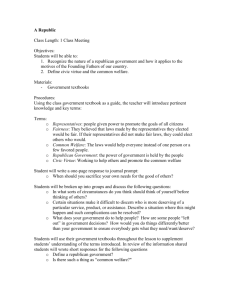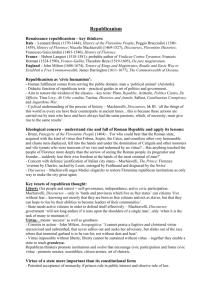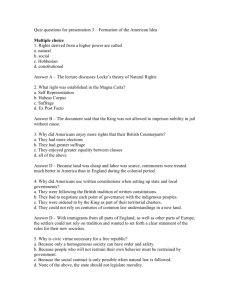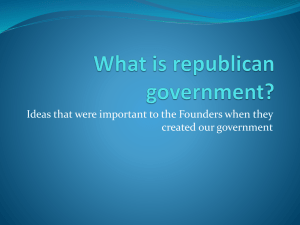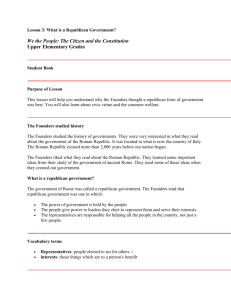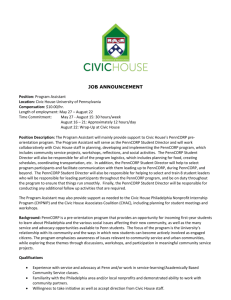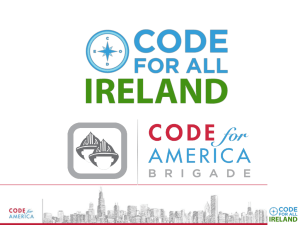Political Thought Didactic function of texts of Early Modern political
advertisement
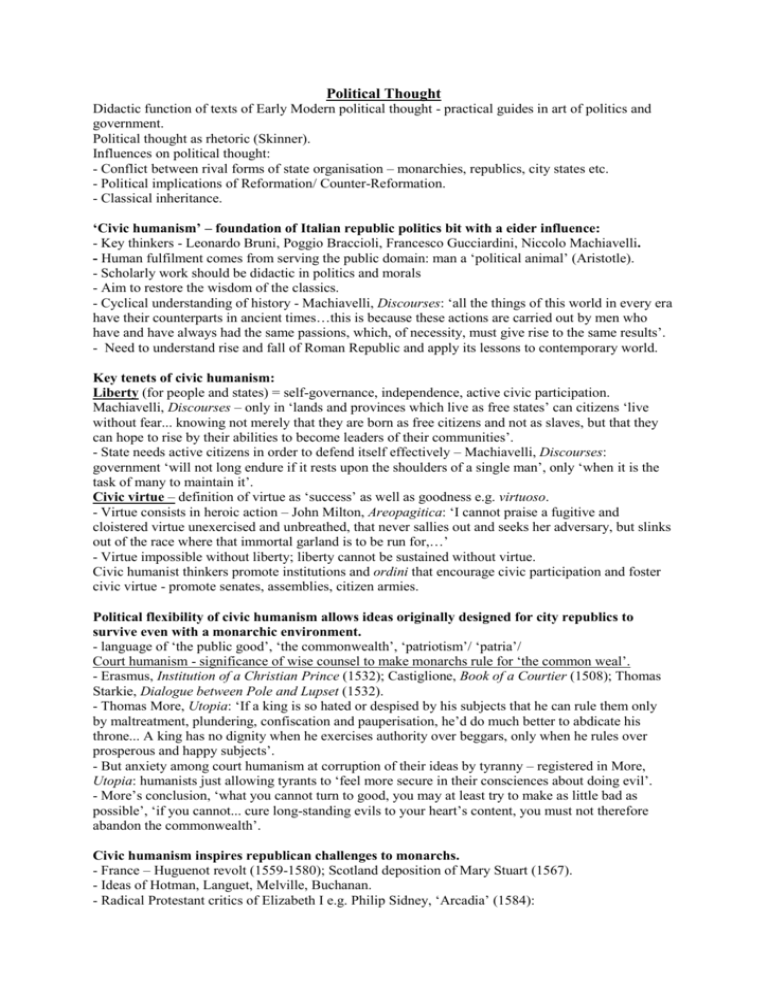
Political Thought Didactic function of texts of Early Modern political thought - practical guides in art of politics and government. Political thought as rhetoric (Skinner). Influences on political thought: - Conflict between rival forms of state organisation – monarchies, republics, city states etc. - Political implications of Reformation/ Counter-Reformation. - Classical inheritance. ‘Civic humanism’ – foundation of Italian republic politics bit with a eider influence: - Key thinkers - Leonardo Bruni, Poggio Braccioli, Francesco Gucciardini, Niccolo Machiavelli. - Human fulfilment comes from serving the public domain: man a ‘political animal’ (Aristotle). - Scholarly work should be didactic in politics and morals - Aim to restore the wisdom of the classics. - Cyclical understanding of history - Machiavelli, Discourses: ‘all the things of this world in every era have their counterparts in ancient times…this is because these actions are carried out by men who have and have always had the same passions, which, of necessity, must give rise to the same results’. - Need to understand rise and fall of Roman Republic and apply its lessons to contemporary world. Key tenets of civic humanism: Liberty (for people and states) = self-governance, independence, active civic participation. Machiavelli, Discourses – only in ‘lands and provinces which live as free states’ can citizens ‘live without fear... knowing not merely that they are born as free citizens and not as slaves, but that they can hope to rise by their abilities to become leaders of their communities’. - State needs active citizens in order to defend itself effectively – Machiavelli, Discourses: government ‘will not long endure if it rests upon the shoulders of a single man’, only ‘when it is the task of many to maintain it’. Civic virtue – definition of virtue as ‘success’ as well as goodness e.g. virtuoso. - Virtue consists in heroic action – John Milton, Areopagitica: ‘I cannot praise a fugitive and cloistered virtue unexercised and unbreathed, that never sallies out and seeks her adversary, but slinks out of the race where that immortal garland is to be run for,…’ - Virtue impossible without liberty; liberty cannot be sustained without virtue. Civic humanist thinkers promote institutions and ordini that encourage civic participation and foster civic virtue - promote senates, assemblies, citizen armies. Political flexibility of civic humanism allows ideas originally designed for city republics to survive even with a monarchic environment. - language of ‘the public good’, ‘the commonwealth’, ‘patriotism’/ ‘patria’/ Court humanism - significance of wise counsel to make monarchs rule for ‘the common weal’. - Erasmus, Institution of a Christian Prince (1532); Castiglione, Book of a Courtier (1508); Thomas Starkie, Dialogue between Pole and Lupset (1532). - Thomas More, Utopia: ‘If a king is so hated or despised by his subjects that he can rule them only by maltreatment, plundering, confiscation and pauperisation, he’d do much better to abdicate his throne... A king has no dignity when he exercises authority over beggars, only when he rules over prosperous and happy subjects’. - But anxiety among court humanism at corruption of their ideas by tyranny – registered in More, Utopia: humanists just allowing tyrants to ‘feel more secure in their consciences about doing evil’. - More’s conclusion, ‘what you cannot turn to good, you may at least try to make as little bad as possible’, ‘if you cannot... cure long-standing evils to your heart’s content, you must not therefore abandon the commonwealth’. Civic humanism inspires republican challenges to monarchs. - France – Huguenot revolt (1559-1580); Scotland deposition of Mary Stuart (1567). - Ideas of Hotman, Languet, Melville, Buchanan. - Radical Protestant critics of Elizabeth I e.g. Philip Sidney, ‘Arcadia’ (1584): - Sidney’s advice to monarchs -‘rage not beyond thy need/ Deem it no glorie to swell in tyranny/ Thou art of blood, joy not to make things bleed’. - Republican ideas in Catholic Europe – Robert Persons: Memoriall for the intended reformation of England (1587); A Conference about the Next Succession to the Crowne of England (1594). Key republican idea – organised political community precedes and can remove the monarch: Algernon Sidney (d. 1683) Discourses concerning government: ‘if the sentinel fall asleep, neglect his duty, or maliciously endeavour to betray the city, those who are concerned may make use of all other means to know their danger and prepare themselves… We may change or take away kings’. Christian Republicanism - Tensions between republican and Christian doctrines due to republican elevation of good of the city as the highest good e.g. Machiavelli placed on Index of Prohibited Books, 1559. - Republican thinkers try to reconcile Christian and classical doctrines. - John Milton: ‘No person is exempt by any law of God from punishment, be he King, Queen or Emperor for God hath not placed them above others’ (Tenure of Kings). Milton - Areopagitica: narrative links rise of Empires with rise of Roman Catholic Church: need to destroy both to recuperate civil and religious liberty. - Milton, Of Reformation - governors have to ‘train up a Nation in true wisdom and vertue’: purpose of government to bring people closer to God. Divine Right ideas develop as reaction to religious wars/ aristocratic revolts of later C16th: -James VI of Scotland - Trew Law of Free Monarchies (1598), Basilikon Doron (1599). - attacks ‘this pernicious opinion; that Popes may tosse the French King his Throne like a tennis ball, and that killing of Kinges is an acte meritorious to the purchase of the crowne of Martyrdome’. - ‘Kings are called Gods by the prophetical king David, because they sit upon God his Throne in the earth, and have the count of their administration to give unto him’. Robert Filmer - Patriarcha, of the Natural Power of Kings written 1653, published 1680 - Royal power is paternal power: mirrors the domestic household, reflects God’s natural law. Attacks - ‘such imaginary pacts between Kings and their peoples as many dream of’. Authoritarian implications: Bossuet - Politics drawn from the very words of Holy Scripture (1670): ‘for the good of the state, one places all force in one power alone. Place any power outside, and you divide the state, ruin the public peace, and create two masters’. Bossuet argues that kingdom must aim for religious uniformity – advocates persecution and expulsion of Protestant Huguenots under Louis XIV. Absolute monarchy distinguished from arbitrary monarchy: Thomas Sheridan : ‘Political Reflexions’ (1688): Parliament important ‘to represent the grievances and oppressions... subjects lie under, by the Tiranny, or unlawful proceedings of his ministers’. Tyrant - will ‘most certainly’ receive punishment in the next world, and ‘very probably in this, as many, very many other extravagant princes have done’ - Concern more with establishing supreme legal authority of monarchs than encouraging despots: James VI – ‘Kinges were the authors & makers of the lawes, and not the laws of Kings’. Thomas Sheridan - Civil and military power should be understood to proceed from the king ‘as light from the sun or stream from the fountain’. Competing visions of legitimate form of power and authority shape conflict in Europe: Hobbes’s Leviathan (1651): attempt to construct a radical alternative - middle ground between ‘those that contend, on one side for too great liberty, and on the other side for too much authority’. - argues that exact system of government less important than capacity to preserve human life. - all government = manmade to serve basic end of preserving life. - People should submit to any govt that offers protection from the violence of a state of nature: these the terms of the ‘social contract’. - But Hobbes a minority voice: Leviathan banned after restoration of English monarchy, 1660.
